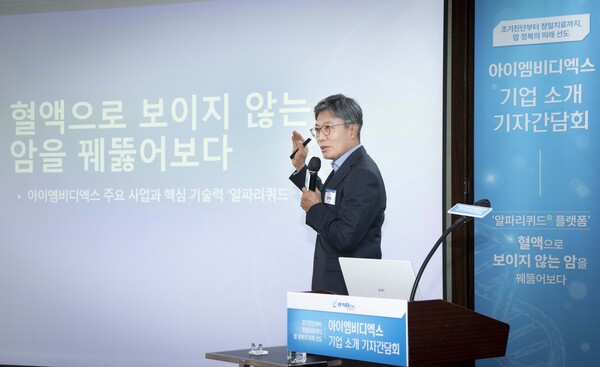IMBdx, a Korean company specialized in early cancer diagnostics, showcased its cancer diagnostic technology, the AlphaLiquid Platform, and shared its future vision for precision medicine and cancer diagnostics during a press conference in Seoul on Wednesday.

IMBdx is developing a liquid biopsy technology based on next-generation sequencing (NGS). NGS tests quickly apply drugs that target specific genes to enhance treatment efficiency.
Liquid biopsy, a diagnostic method for cancer that utilizes blood, urine, or cerebrospinal fluid instead of traditional tissue samples, has garnered significant attention. It earned recognition as one of the World Economic Forum's top 10 promising future technologies in 2017.
The Korean government started reimbursing NGS tests for the top 10 cancers in March 2017 and expanded to all types of cancer in May 2019.
"IMBdx's flagship product is a proprietary precision medicine diagnostic tool called AlphaLiquid," IMBdx co-CEO Kim Tae-you said. "AlphaLiquid is a comprehensive genomic profiling (CGP) test that can simultaneously examine 118 cancer-related genes from a single blood sample, enabling personalized precision treatment."
It's also applicable to patients with stage 3-4 solid tumors, he added.
According to Kim, the company's platform is currently in use at 31 hospitals in Korea, including prestigious institutions like Seoul National University Hospital, Samsung Medical Center, National Cancer Center, and Korea University Hospital.
"The company also recently signed a companion diagnostic (CDx) agreement with AstraZeneca and is conducting clinical validation for the companion diagnosis of Lynparza for patients with progressive prostate cancer," Kim said.
Kim also outlined the company's plans to actively pursue the commercialization of the liquid biopsy early cancer screening service, CancerFind.
"Liquid biopsies analyze cancer cells or DNA derived from cancer cells in bodily fluids to detect cancer onset, metastasis, and gene mutations," Kim said. "CancerFind is a product that can screen for multiple cancers with a single blood test."
Kim added that CancerFind overcomes various limitations of conventional cancer screening, making it suitable for patients facing challenges in obtaining tissue samples, monitoring treatment responses, verifying resistance genes during cancer therapy, and conducting early post-cancer surgery screenings.
Kim explained that CancerFind analyzes the genetic and epigenetic properties of circulating tumor DNA (ctDNA) fragments in blood, providing information about the cancer's origin.
"ctDNA exists at a level of one in a 100,000 within the 10,000 DNA fragments found in 10ml of blood," he said. "As a result, this is a field that requires advanced DNA capture technology and genetic analysis."
The company has confirmed the superior efficacy of CancerFind compared to traditional blood and imaging tests, as it showed a high sensitivity (87.7 percent) and specificity (96.1 percent).
Kim also introduced CancerDetect, a custom AI ultra-precision genetic testing platform.
"This platform can monitor recurrence in post-cancer surgery patients," he said. "By observing genetic mutations like single nucleotide variants and InDel through regular tests after surgery, CancerDetect can determine recurrence months earlier than conventional imaging tests."
As the demand for genetic tests among patients in clinical settings is skyrocketing, the company will focus on enhancing its product's competitiveness to improve patient accessibility, he added.
Meanwhile, IMBdx was founded as a spin-off of the Liquid Biopsy Project of the Cancer Unit at Seoul National University Hospital and was officially launched in 2018.
The company is currently preparing to be listed on the tech-heavy Kosdaq market. In June, the company received an A grade in a technical evaluation to apply for Kosdaq's special technology listing system, followed by a preliminary review application in August.

